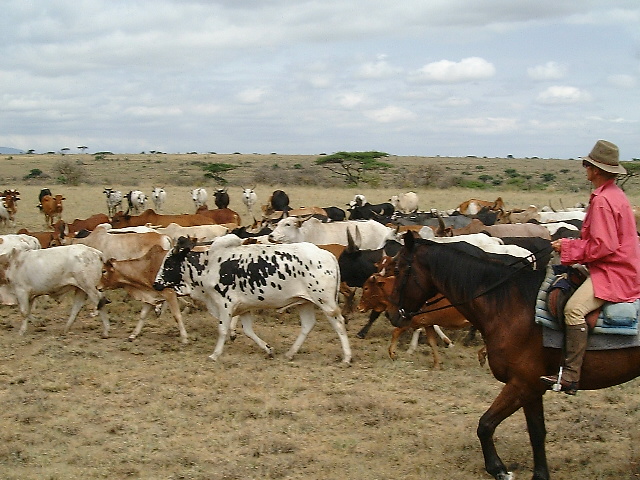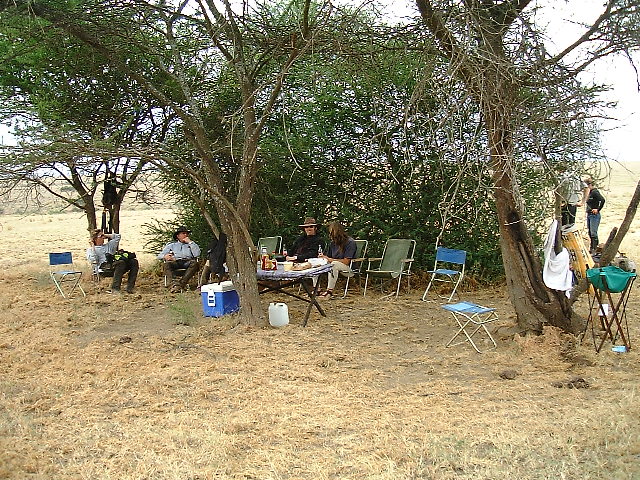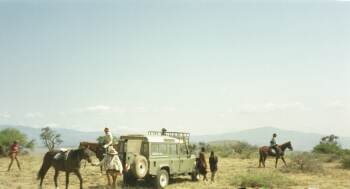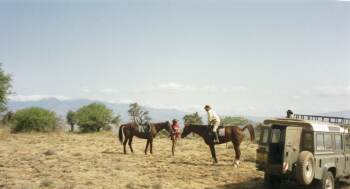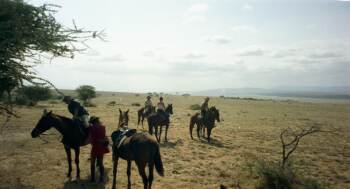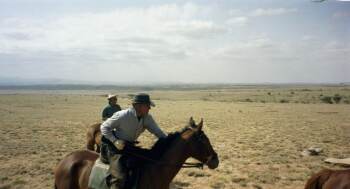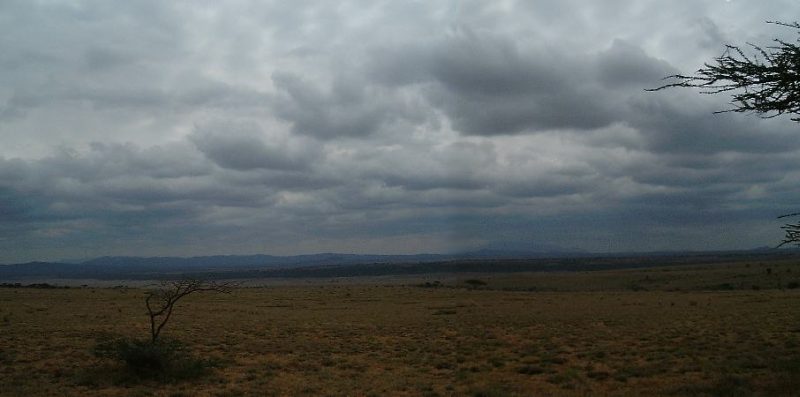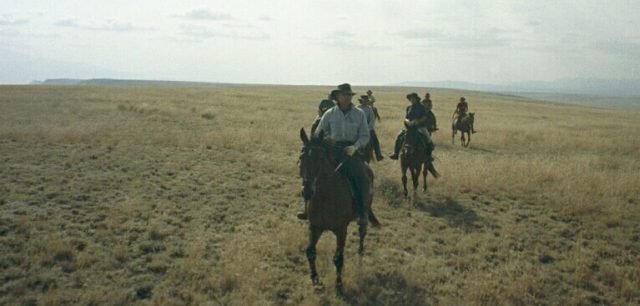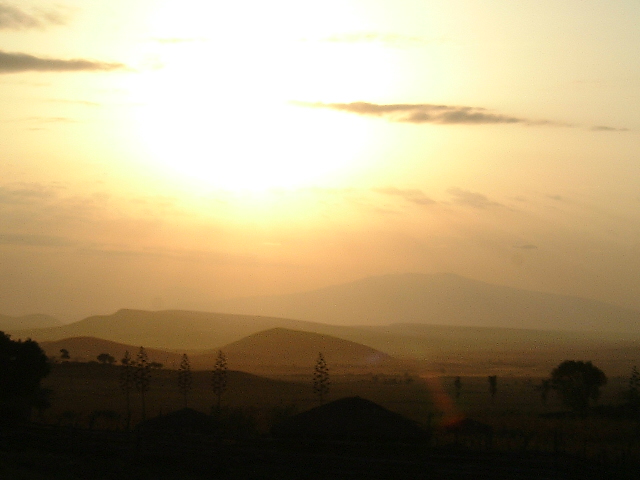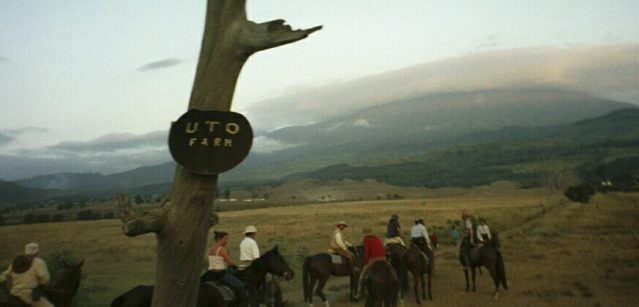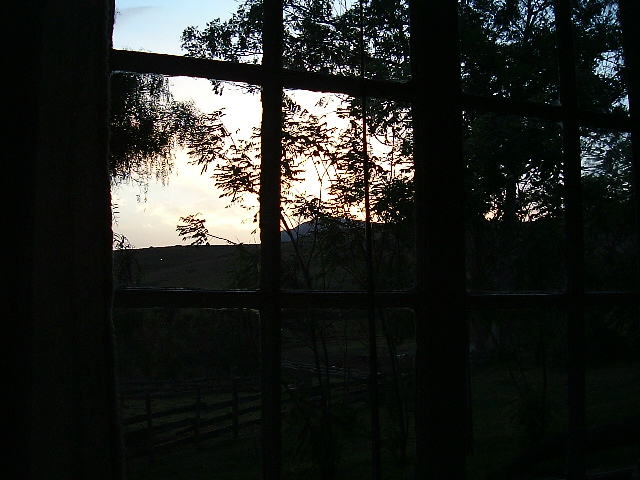|
Journey to Lake Natron and
Back
A photo essay by John FuhringOur Final Ride. Our final day of riding started out as a comfortably overcast morning. We left camp in a southwestern direction for a mile or two and I wondered at this, but perhaps we went that way to avoid hard ground. After a while, we headed on a fairly steady course to the southeast. The footing was pretty soft and my horse was doing OK - I have no idea how the other horses or Lisa's horse were doing. The ride was pretty uneventful except we did
pass a herd of Masaai cattle. These were the nicest looking cattle
I have seen in Tanzania and I took a few pictures from horseback to show
you what they looked like. I think the Masaai herders were really
surprised to see us, but friendly. We rode by quietly so as not to
spook or herd the cattle away from their owners. I have also included
some pictures of my safari comrades and a termite mound to show the general
nature of the countryside.
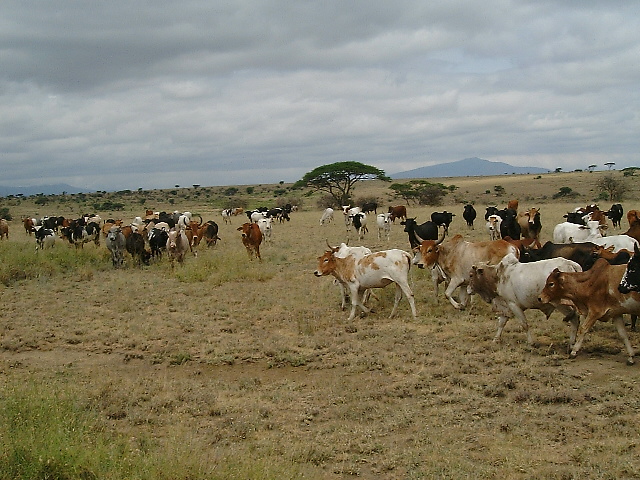 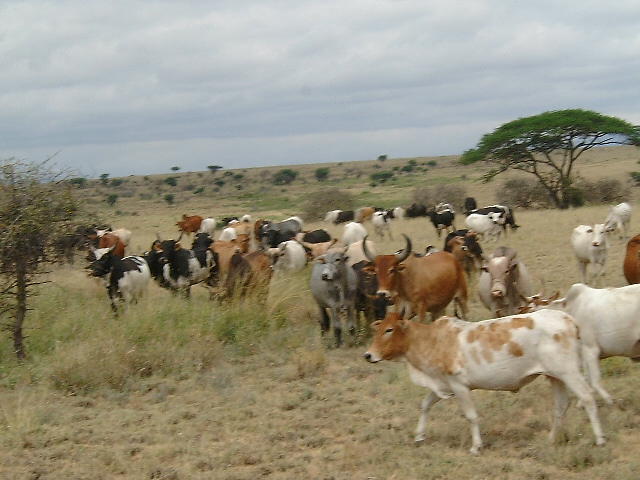 A relatively large herd of healthy looking cattle
 A termite mound damaged by the earlier rains. 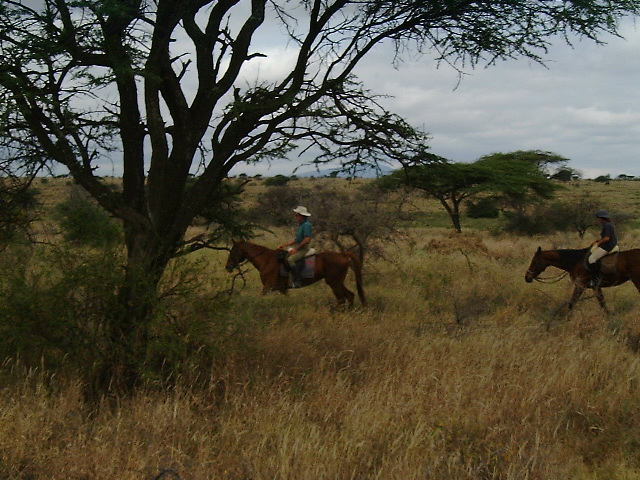 Scenes from the African Savannah. Benard leading the way. 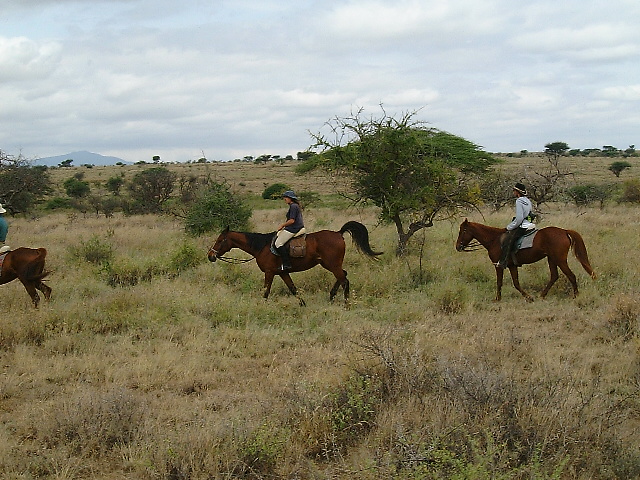 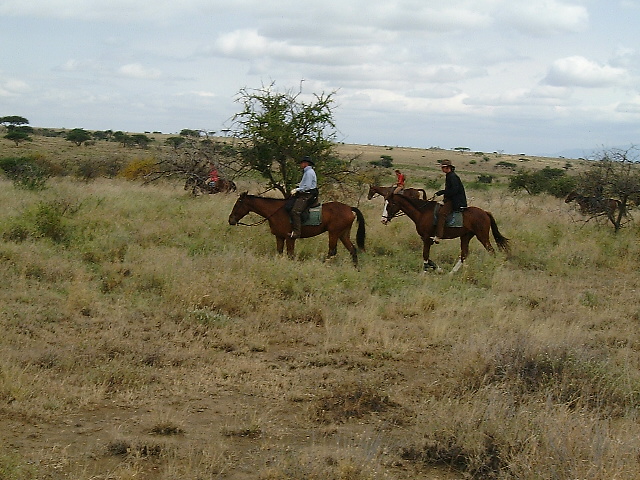 Followed by Florence, Bernadette, Stefan and Dr. Camillo. Lisa, Janice and Tom are in there somewhere. Yes, Yes, I know that many a weak rider or non rider will fault me for going too fast and getting another horse "get all fired up" but consider that it wasn't me that started the race and more than anything else, if you can't control your horse, it's nobody else's fault but your own for being a shitty horseman. All of us out there were supposed to be "Level D" horsemen and able to control even high spirited horses. Annabelle did just fine even if Cougar was out of control for a while. Besides all that, I can't tell you how much fun it is to finally let a spirited horse have a good run. Holding it back for nearly two weeks on the trail makes you and especially the horse a nervous and frustrated wreck and the only cure is to just let it run. As always, Elizabeth had prepared a very nice lunch for us. Once again, I would have preferred to get on the trail after a short rest, but we took our usual siesta lasting about two hours. That extended stay did give us a chance to walk a couple hundred yards out to there the plateau we were on dropped down to reveal a long valley way down below us. Florence and I were admiring the view from up there when we were joined by a couple of Masaai kids. The boys were about 10 or 12 I guess and seemed to be nice kids. I knew it was useless to try to speak to them in English, so our communications were in smiles and pointing. I had earlier fetched my binoculars from my day pack in the Land Rover and had spotted some boma settlements scattered in the valley below and at varying distances. Florence and I attempted to determine, if we could, which settlement the boys might be from by pointing at them then pointing to the distant bomas with a questioning look. I'd hand the binoculars to the boys - who seemed really delighted to see things close up - but their answers in Masaai really didn't answer our questions. Anyway, we'd point to things and Florence would say something in French and they would say something in their language, but that's about all the further the attempt at cultural exchange progressed. I couldn't help but be impressed
once again with how friendly and quietly dignified the Masaai I met were.
They asked for nothing from us and what is more important, they were not
frightened or overly impressed with us. I definitely had this feeling
that we were looked on as equals by equals. I don't know what their
social hierarchies are like, but from what I've seen they must be very
egalitarian. The overall impression I had was that they in no way
considered themselves inferior to us or anyone else and were not scared
of us nor expected us to feel inferior or be scared of them. I never
saw any of them put on a show to try to impress us with how important or
powerful they are or to intimidate us in any way. It is my belief
that by rejecting the teachings of the missionaries, these people have
evidently kept a sense of pride, self assurance and self reliance that
is very, very refreshing for me to see in native or otherwise non-European
people. Now, having said all that, I have been told that the young
warriors (the Moran) can be very arrogant and even dangerous if you cross
them. Maybe that is so, but I have no first hand knowledge of it.
Our last bush meal and our last siesta was
over and it was time to saddle up and make that final dash back to the
Farm. I must admit, I was in no way sorry, but rather wanted to be
back just as soon as possible. I had had about as much fun as I could
stand on this trip. One could easily see Mt. Maru to the southeast
and my GPS said we had a goodly distance to cover that afternoon.
Again, I was sorry we didn't get an earlier start because I knew we were
going to be on the trail late again this evening. We also learned
that Lisa wouldn't be riding with us because her horse evidently had given
out and wouldn't carry her any further. Lisa's horse was to be allowed
to run loose to pick its own way without the encumbrance of a rider.
Too bad, but Tom would lead the way and by now we could see the mountain
at the base of which was the Farm and the end of our ride.
The following are pictures of the Rift Valley scenery we encountered along the way. Nothing very spectacular, but I might add that the grass was now less green than we had started 11 days earlier. Like here in California, after the last rain of the wet season, it doesn't take very long for the grass to fade out the the countryside start looking brown. At some point Tom decided
that we needed to catch Lisa's horse and "pony" it near us by having a
rider hold its lead line. After Janice made a fruitless attempt at
coming up to it, I quietly rode up and snatched its halter and untied its
lead rope. This horse and my horse, Queen, were friends and were
very happy to ride along with each other. I was very happy to pony
the horse because it had a calming effect on my horse and (more than anything
else) it gave me something to do and a sense of usefulness. This
ponying exercise went on for several miles when, for some unexplainable
reason, Janice didn't want me to "do her job anymore" or some such nonsense.
She insisted I give her the horse so, with some bad grace on my part, I
gave her the horse. Unlike me, she had nothing but trouble with the
horse and finally had to let it wander as it would. I'm sorry to
say it, but this made me mad that those people wouldn't let me help in
even this one very trivial way. And it's not like they were doing
much of anything all that well either.
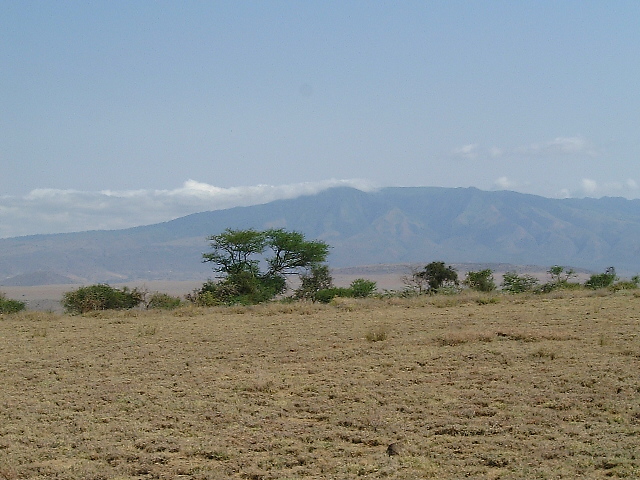 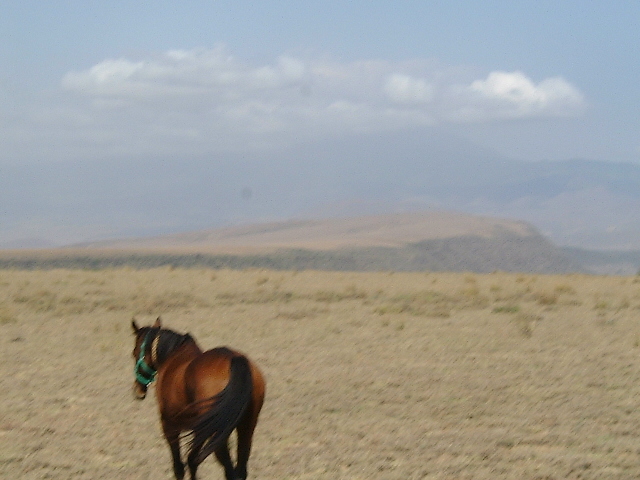 Mt. Monduli in the upper picture with Lisa's horse in the lower picture. 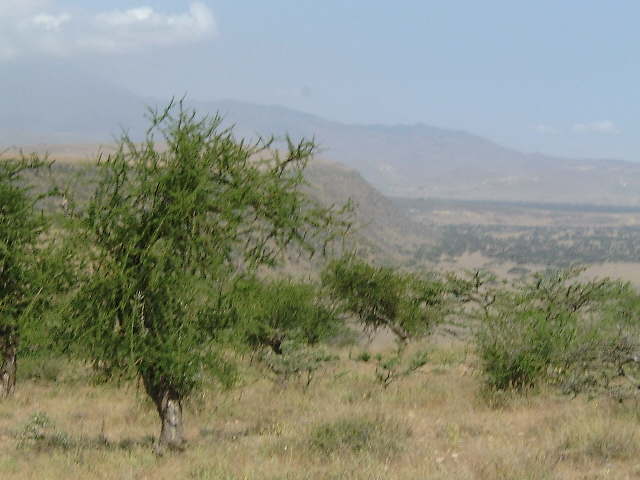 Rift Valley escarpment near where we had our first lunch. 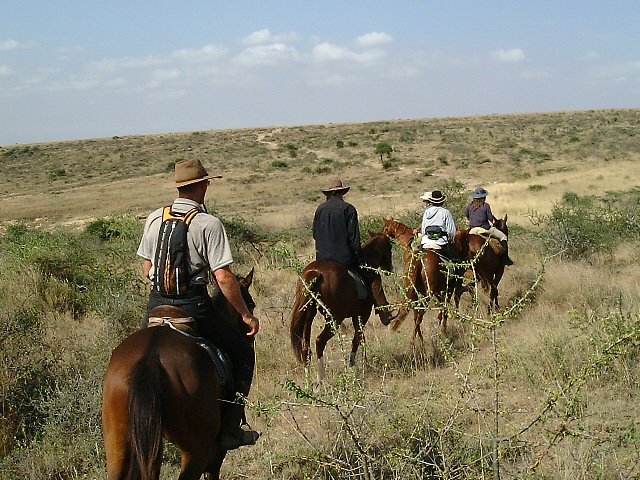 Florence leading with Tom bringing up the rear. 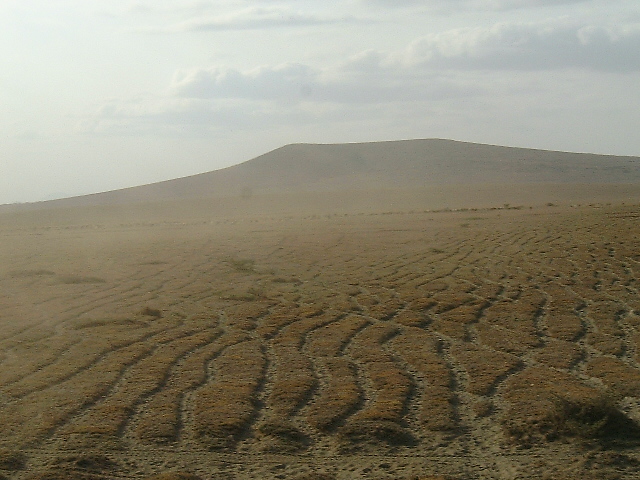 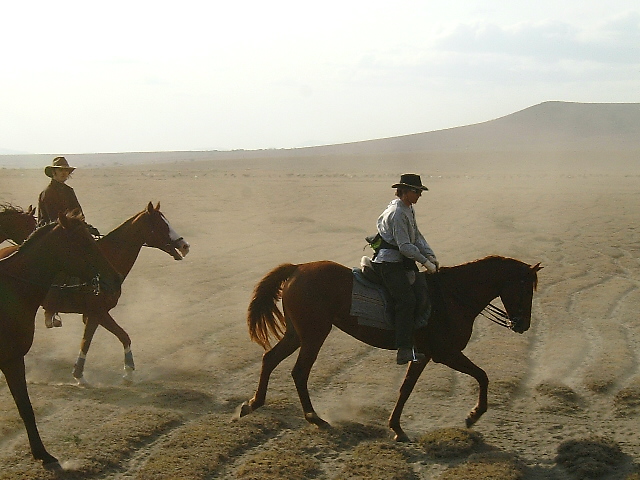 Riding over damaged farmland.
Riding further east, we started getting into better looking plantations. Unlike Oklahoma, the corn wasn't "as high as an elephant's eye" and it wasn't "reaching way up to the sky." Matter of fact, it was rather stunted looking. Still, there were some large fields of it and I hope there was enough to feed the native peoples living in the region. By now we could see the Farm as a white dot on the side of Mt. Maru. I knew it was the Farm because my GPS and compass pointed right at the dot. It was a little frustrating because we didn't know the shortest and most direct way through all the crisscrossing roads separating the planted fields and so went out of our way quite a bit while trying to wend our way toward the Farm. Lisa's horse was loose (as mentioned before) and Tom wanted to have it on a lead line again, but it kept running away from us as we approached. It and the other horses knew exactly where we were and knew we weren't far from home, food, water and rest. I volunteered to quietly go after it and after my earlier success was astounded when Tom forbad me from trying. Janice again went after it with no success. Finally, as we were getting close to the Nairobi to Arusha "international highway" Annabelle caught it and then had a hell of a time keeping it under control. I foolishly tried to bring my horse in a vain attempt to settle it down and only succeeded in making the situation worse. Finally, Annabelle told me to get away and I could see she was right. 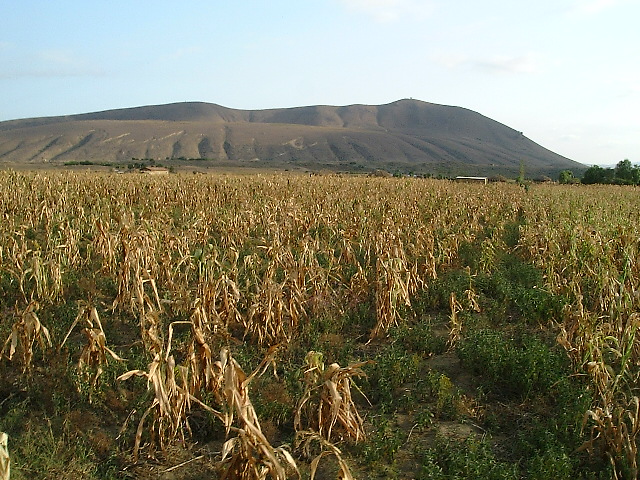
It was getting late by now and I was afraid we wouldn't make it to the Farm before dark. To make matters worse, the horses were anxious to get home and were becoming a handful. Also the ground became very hard and rocky and it was hard to see them carefully picking their way through the stones and limping when they stepped on a sharp one. I have a confession to make. By this time, I was sore, tired, had a bad headache and was in a terrible mood. I was really beat up from trying to control that damn horse of mine. My horse and I suspect the other horses too were frantic to get home and were barely under control. I was almost beside myself with fatigue, anger and disappointment and I said some rather unkind (but true) things out loud and to Janice. After a couple of outbursts and a nasty reply, I kept my thoughts to myself. Earlier I said that I had never encountered anything hostile from a native. Well that wasn't exactly true. As we were approaching the highway, we passed another area under cultivation. There was a young fellow leading a donkey loaded up with two large plastic cans of water. It was almost dusk and I'm sure the guy was taking precious, clean drinking water to his home for the night. The donkey went berserk when it saw our horses and instead of stopping our column and waiting for it to calm down, we continued marching on. The donkey bucked and pitched and threw off the jugs where they emptied into the thirsty ground. The young fellow looked stricken and I think I know why - the hour was late and it would be very difficult to catch the donkey, load the jugs, go back to where he got the water, refill the jugs and then return home before it was pitch dark. He gave us an angry look and I wish to hell I could have helped him, but besides looking sympathetic, there was nothing I could do. Oh well, compared to what the Israelis and Palestinians were suffering at the hands of each other at that very moment, this one wasn't so bad. The sun was low down in the sky
and there was a rather beautiful yellow sunset that I was able to capture
somewhat by pointing my little digital camera behind me as we rode along.
I figured that was the only attempt at photographing the end of this last
day I'd have and I was right because by the time we had made the "International
Highway" and crossed the two lanes, the sun was pretty much down.
After we arrived at the Farm
I can't remember any spontaneous shouts of elation. Myself, I was
feeling kind of numb when we unsaddled the horses and led them away to
their stalls. They as much or more than us needed food, water, rest
and some much needed recuperation. Many of the horses had severely
damaged hoofs. The wonderful thing about hoofs is that they are a
living system and Nature can heal almost any damage to them if given time
and rest. To my knowledge none of the animals were injured in such
a way that they wouldn't grow new hoof and be perfectly sound eventually.
My guess was that none of them would require more than 4 to 6 weeks (at
the most) before they would be sound again. Still, it's a damn shame
that so many of them had to suffer as much as they did.
I can't remember what I did that evening. Hung around porch and had a couple of drinks after supper I think. I must have slept pretty hard because I didn't wake up until the sun was about to come through my window. The Lake Natron Expedition was over and I sure
had and still have mixed emotions about it.
|
